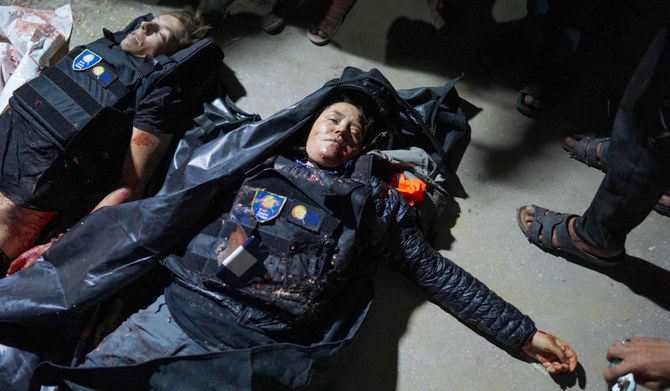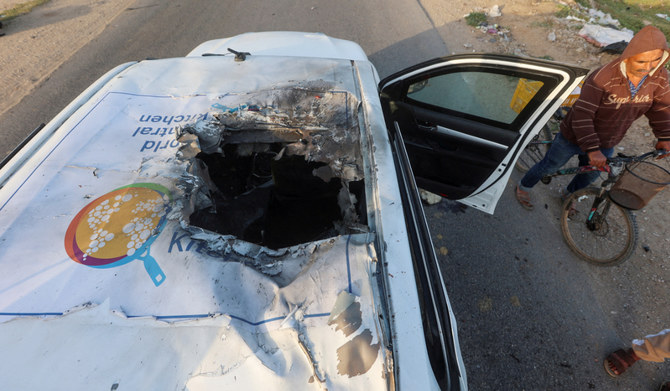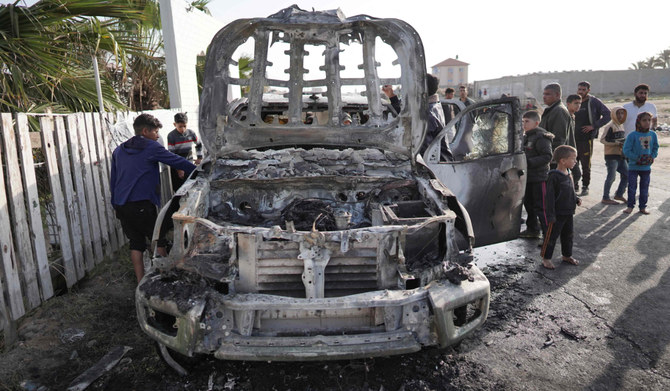DEIR AL-BALAH, Gaza Strip: Some of Israel’s closest allies on Tuesday condemned the deaths of seven aid workers who were killed by airstrikes in Gaza — a loss that prompted multiple charities to suspend food deliveries to Palestinians on the brink of starvation.
The deaths of the World Central Kitchen workers threatened to set back efforts by the US and other countries to open a maritime corridor for aid from Cyprus to help ease the desperate conditions in northern Gaza.
Ships still laden with some 240 tons of aid from the charitable group turned back from Gaza just a day after arriving, according to Cyprus. Other humanitarian aid organizations also suspended operations in Gaza, saying it was too dangerous to offer help. Israel has allowed only a trickle of food and supplies into Gaza’s devastated north, where experts say famine is imminent.
The dead from Monday night’s strikes included three British citizens, Polish and Australia nationals, a Canadian-American dual national and a Palestinian. Those countries have been key backers of Israel’s nearly 6-month-old offensive in Gaza, and several of them denounced the killings.
Israel already faces growing isolation as international criticism of the Gaza assault has mounted. On the same day as the deadly airstrikes, Israel stirred more fears by apparently striking Iran’s consulate in Damascus and killing two Iranian generals. The government also moved to shut down a foreign media outlet — Qatari-owned Al Jazeera television.
The hit on the charity’s convoy also highlighted what critics have called Israel’s indiscriminate bombing and lack of regard for civilian casualties in Gaza.
Israeli Prime Minister Benjamin Netanyahu acknowledged that the military had carried out the “unintended strike ... on innocent people.” He said officials were investigating and would work to ensure it does not happen again.
World Central Kitchen said it had coordinated with the Israeli military over the movement of its cars. Three vehicles moving at large distances apart were hit in succession. They were left incinerated and mangled, indicating multiple targeted strikes.
At least one of the vehicles had the charity’s logo printed across its roof to make it identifiable from the air, and the ordnance punched a large hole through the roof. Footage showed the bodies at a hospital in the central Gaza town of Deir Al-Balah, several of them wearing protective gear with the charity’s logo.
Israeli TV said the initial military investigation found that the army identified the cars carrying World Central Kitchen’s workers arriving at its warehouse in Deir Al-Balah and observed suspected militants nearby. Half an hour later, the vehicles were struck by the air force as they headed south. The reports said it was not clear who ordered the strikes or why.
Throughout the war, Israel has said it seeks to avoid civilian casualties and uses sophisticated intelligence to target Hamas and other militants. Israeli authorities blame them for civilian deaths because they operate in populated areas.
At the same time, Israel has also insisted that no target is off-limits. Israeli forces have repeatedly struck ambulances and vehicles carrying aid, as well as relief organization offices and UN shelters, claiming that armed fighters were in them.
Israeli forces have also shown a readiness to inflict widespread destruction on suspicion of a militant presence or out of tactical need. Homes with Palestinian families sheltering inside are leveled by strikes almost daily with no explanation of the intended target. Videos of strikes released by the military often show them hitting individuals without visible weapons, while identifying them as militants.
More than 32,900 Palestinians have been killed in the war, around two-thirds of them women and children, according to Gaza’s Health Ministry, which does not distinguish between civilians and combatants in its count.
Celebrity chef José Andrés, who founded the World Central Kitchen charity, said he was “heartbroken” by the deaths of the staffers.
“The Israeli government needs to stop this indiscriminate killing. It needs to stop restricting humanitarian aid, stop killing civilians and aid workers, and stop using food as a weapon,” he wrote on X, formerly Twitter.
The US, Britain, Poland, Australia and Canada all called on Israel to give answers on the deaths. Israeli Defense Minister Yoav Gallant launched an investigation and ordered the opening of a joint situation room enabling coordination between the military and aid groups.
But anger among its allies could put new pressure on Israel.
The British government summoned Israel’s ambassador for a rebuke and called for an immediate humanitarian pause to allow more aid in and the release of hostages.
British Prime Minister Rishi Sunak told Netanyahu that he was “appalled” by the workers’ deaths and described the situation in Gaza as “increasingly intolerable.”
White House national security spokesman John Kirby said the US was “outraged” to hear of the strikes. He said the Israeli military “must do much more” to avoid conflict and ensure the safety of aid convoys.
A senior Canadian government official said there will be a joint formal diplomatic rebuke at the foreign ministry in Israel on Wednesday. The official also said a top official with Canada’s Global Affairs department made a formal representation to Israel ambassador’s to Canada on Tuesday. The official spoke on condition of anonymity as they were not authorized to speak publicly on the matter.
The deaths sent a further chill through UN agencies and other aid groups that have said for months that sending truck convoys around Gaza — particularly in the north — has been extremely difficult because of the military’s failure to either grant permission or ensure safe passage. Israel has barred UNRWA, the main UN agency in Gaza, from making deliveries to the north.
The US and other countries have been working to set up the sea passage from Cyprus to get around the difficulties.
World Central Kitchen was key to the new route. It and the United Arab Emirates sent a pilot shipment last month. Their second delivery of around 400 tons of food and supplies arrived in three ships to Gaza hours before the strikes on the convoy.
Around 100 tons were unloaded before the charity suspended operations, and the rest was being taken back to Cyprus, Cypriot Foreign Ministry spokesman Theodoros Gotsis said.
Still, Cypriot President Nikos Christodoulides said Tuesday that ship deliveries would continue.
Anera, a Washington-based aid group that has been operating in the Palestinian territories for decades, said that in the wake of the strikes it was taking the “unprecedented” step of pausing its own operations in Gaza, where it had been helping to provide around 150,000 meals daily.
“The escalating risks associated with aid delivery leave us with no choice,” it said in a statement.
Jamie McGoldrick, the United Nations humanitarian coordinator for the Palestinian territories, said the strikes were “not an isolated incident.” The UN says more than 180 humanitarian workers have been killed in the war.
“This is nearly three times the death toll recorded in any single conflict in a year,” he said.
The war began when Hamas-led militants stormed into southern Israel in a surprise attack on Oct. 7, killing some 1,200 people and taking around 250 hostage. Israel responded with one of the deadliest and most destructive offensives in recent history.
Two other Israeli strikes late Monday killed at least 16 Palestinians, including eight children, in Rafah, where Israel has vowed to expand its ground operation. The city on the Egyptian border is now home to some 1.4 million Palestinians, most of whom have sought refuge from fighting elsewhere.
One strike hit a family home, killing 10 people, including five children, according to hospital records. Another hit a gathering near a mosque, killing at least six people, including three children.
With famine looming, aid group halts food delivery in Gaza after Israeli strike kills 7 workers
https://arab.news/gy6h5
With famine looming, aid group halts food delivery in Gaza after Israeli strike kills 7 workers

- The dead from Monday night’s strikes included three British citizens, Polish and Australia nationals, a Canadian-American dual national and a Palestinian
- Israel has killed over 32,705 Palestinians in Gaza, two-thirds of them women and children, according to the Gaza Health Ministry
Simmering anger as Turkiye buries ski hotel fire victims

- The fire, which began in the middle of the night, struck at peak season for the hotel, with 238 guests staying for the winter school holidays which began on Friday
KARTALKAYA, Turkiye: Anger was growing in Turkiye on Wednesday as allegations piled up that negligence played a role in the deaths of 79 people who perished when a huge fire swept through a luxury ski resort hotel in northern Turkiye.
With the nation observing a day of mourning, grieving families began burying their dead as questions multiplied about fire safety measures at the 12-story Grand Kartal Hotel perched on a mountaintop in the Kartalkaya resort.
Front pages, including those of the pro-government dailies, were plastered with allegations of negligence which they blamed for the shocking death toll.
On a freezing foggy morning, with flags flying at half-mast, 12 of the 51 injured were still in hospital, including one in intensive care.
“There is no excuse for such a high number of deaths in 2025,” Ozgur Ozel, leader of the main opposition CHP party, said outside the blackened facade of the hotel where rescuers were combing through the ruins on Wednesday.
The fire, which began in the middle of the night, struck at peak season for the hotel, with 238 guests staying for the winter school holidays which began on Friday.
At a funeral in the nearby town of Bolu for eight members of the same family who died in the blaze, President Recep Tayyip Erdogan could be seen wiping away tears, his head bowed.
“When I got to the hotel, there were flames everywhere and we could hear screams,” said Cevdet Can, who runs a nearby ski school.
“I saw one person jump out of the window” to her death, Can told AFP, adding that it was seeing children trapped “that upset me most.”
Another ski instructor who escaped the hotel unharmed said he was unable to rescue his pupils, the youngest of whom was six.
“I lost five of my students who were staying on the sixth and seventh floors,” 58-year-old Necmi Kepcetutan told AFP, adding that another colleague had jumped to her death.
The blaze broke out around 3:30 am (0030 GMT), sparking panic among the guests, many of whom tried to climb out of the windows, using bedsheets as ropes.
Some fell to their deaths, media reports said.
Speaking to Turkish media outlets, many survivors told the same story: that there were no alarms warning them about the fire, no fire doors, and no safe ways for people to exit the hotel.
Tourism Minister Nuri Ersoy on Tuesday said that the hotel had passed an inspection last year and had two fire escapes, saying “no issues related to fire safety had been flagged by the fire department.”
A rescuer with the national catastrophe management agency Afad told AFP on condition of anonymity that “I saw fire escapes, but I suggest comparing this hotel’s fire escapes to those at nearby hotels. In the end, experts will decide.”
So far, 11 people have been arrested, among them the hotel’s owner, general manager, director and chief electrician, as well as the chief of Bolu’s fire department, the justice ministry told AFP.
The hotel’s management has presented its condolences and said it would cooperate with authorities to “shed full light on this accident.”
Situated at one of the most expensive ski resorts in Turkiye, the hotel boasted a prestigious client list that included executives, entrepreneurs and well-known doctors, many of whom were there with their children and family members.
By Wednesday afternoon, more than 20 victims had yet to be identified.
To secure Gaza ceasefire, dealmakers overcame enemies’ deep distrust

- The deal calls for Israel and Hamas to resume talks just over a week from now, to work out the second phase. That is supposed to include the release of all remaining hostages, living and dead, and a permanent ceasefire
Inside a lavish clubhouse on Doha’s waterfront, tensions strained by months of fruitless back-and-forth weighed on negotiators as the hour neared 3 a.m.
On the first floor, a Hamas delegation whose leader had once evaded an Israeli airstrike that killed seven family members combed through the details of yet another proposal to halt the war in Gaza. On the second floor, advisers to Israel’s intelligence chief, who had vowed to hunt down those responsible for the Oct. 7, 2023, attack that ignited the war, did the same.
With Qatari, US and Egyptian mediators pushing for resolution, did the sides — such bitter enemies that they refused to speak directly to one another — at last have a deal to pause the fighting and bring dozens of Israeli hostages home?
“They were extremely suspicious toward each other. No trust at all,” said an Egyptian official involved in the negotiations, who spoke on condition of anonymity. The talks that night a week ago dragged on over disagreements about maps showing where Israel would begin withdrawing troops and its demand that Hamas provide a list of hostages who remained alive, he said.
“Both parties were looking at each word in the deal as a trap.”
By the time Qatar’s prime minister, Sheikh Mohammed bin Abdulrahman Al Thani, announced a ceasefire deal last Wednesday evening, mediators had scrambled again to defuse objections by both sides. Even then, disagreements and delays continued over the two days that followed.
But as the fighting in Gaza paused this week, three young Israeli women were released from captivity and dozens of Palestinian prisoners were freed by Israel, the agreement, however tenuous, has held.
After months of deadlock, a singular moment for dealmaking
The story of how Israel and Hamas found their way to a deal stretches back over more than a year. But the timing and unlikely partners who coalesced to push negotiations across the line help explain why it finally happened now.
“Over the course of the last week all of the stars aligned finally in a way that, after 15 months of carnage and bloodshed, negotiations came to fruition,” said Mehran Kamrava, a professor of government at Georgetown University in Qatar.
The agreement was the product of a singular political moment, with one US president preparing to hand power to another.
Both were pushing for a deal to free some 100 Israeli hostages and bring an end to a conflict that began with the killing of about 1,200 in Israel and that Palestinian health officials say has killed more than 47,000 in Gaza.
The health officials do not distinguish between civilians and militants, but say more than half of those killed were women and children.
In tiny but wealthy Qatar, the talks had a steward that positions itself as a go-between in a region on edge, one that hosts the largest US military base in the Middle East even as it provides offices for leaders of Hamas and the Taliban. Egypt, eager to ease instability that has driven an influx of Palestinians across its border and sparked attacks on sea lanes by Houthi rebels, worked to keep the talks on track.
The circumstances partnered Sheikh Mohammed with improbable allies. Then-President Joe Biden sent Brett McGurk, a veteran Middle East hand in both Republican and Democratic administrations. Donald Trump dispatched Steve Witkoff, a Bronx-born real estate billionaire with little if any diplomatic experience, but a longtime friendship with the then-president-elect.
The deal they brought together calls for continued negotiations that could be even more fraught, but with the potential to release the remaining hostages and end a war that has destroyed much of Gaza and roiled the entire region.
Pressure mounted on Israel and Hamas
In the end, negotiators got it done in a matter of days. But it followed months of deadlock over the number of Israeli hostages that would be freed, the number of Palestinian prisoners to be released and the parameters of a pullback by Israeli troops in the embattled enclave.
In late May, Biden laid out a proposed deal, which he said had come from Israel. It drew heavily on language and concepts hammered out with Qatari and Egyptian mediators, calling for a phased agreement with continued negotiation toward a “sustainable calm” – verbiage designed to satisfy both sides.
But talks had stalled even before the detonation of a bomb, attributed to Israel, in late July killed Ismail Haniyeh, the head of Hamas’ political bureau. And efforts by mediators to restart them were derailed when Israeli forces found the bodies of six hostages in a Gaza tunnel in August.
“Whoever murders hostages does not want a deal,” Israeli Prime Minister Netanyahu said.
Pressure on Hamas increased after Israeli forces killed leader Yahya Sinwar — an architect of the Oct. 7 attack — and launched a devastating offensive against Lebanon’s Hezbollah, the group’s longtime ally.
But Qatari officials, frustrated by the lack of progress, announced they were suspending mediation until both sides demonstrated willingness to negotiate.
Weeks later, Trump dispatched Witkoff, a golfing buddy whose most notable prior link to the Middle East was his $623 million sale of New York’s Park Lane Hotel to Qatar’s sovereign wealth fund in 2023.
Flying to Doha in late November, Witkoff asked mediators to lay out the problems undermining the talks, then continued on to meet officials in Israel. The talks restarted soon after, gaining ground through December.
“Witkoff and McGurk were pushing the Israelis. Qatar was pushing Hamas,” said an official briefed on the talks who spoke on condition of anonymity.
Cooperation between Biden and Trump advisers was key
Assigning credit for the progress depends on viewpoint.
The Egyptian official recounted the frustration of successfully pushing Hamas to agree to changes last summer, only to find Netanyahu imposing new conditions.
An Israeli official who spoke on condition of anonymity last week because the negotiations were ongoing said Sinwar’s death and Iran’s weakening influence in the region forced Hamas’ hand, leading to real give-and-take rather than “playing a game of negotiation.”
He and others close to the process said Trump’s rhetoric and dispatch of an envoy had injected new momentum. The Egyptian official pointed to a statement by Trump on social media that there would be “hell to pay” if the hostages were not released, saying it had pressured both Hamas and Israeli officials to get a deal done.
And mediators said the willingness of Witkoff and McGurk — representing leaders loathe to give one another credit for the deal – to partner up was critical.
“How they have handled this as a team since the election, without yet being in office, has really helped close the gaps that allowed us to reach a deal,” Majed Al Ansari, the adviser to Qatar’s prime minister and spokesperson for the Ministry of Foreign Affairs, said in a statement.
In early January, there was a breakthrough in the talks when Hamas agreed to provide a list of hostages it would release in the first phase of a deal, an official briefed on the talks said.
McGurk flew from Washington to Doha hours later. Witkoff followed at week’s end.
The following day – Saturday, January 11 – Witkoff flew to Israel, securing a meeting with Netanyahu even though it was the Jewish sabbath. McGurk called in. Netanyahu agreed to send the heads of Israeli intelligence and internal security back to Doha for negotiations.
That led to extended negotiations, most convening in the Qatari prime minister’s private office, that lasted late into the night.
At points, mediators shuttled back and forth between adversaries on different floors. At others, the chief negotiators for the two sides cycled separately into the prime minister’s office to hash out details.
“But the Hamas and Israeli delegations never crossed paths,” said the official briefed on the talks.
Ceasefire conditions debated up until the last moment
After the lead negotiators for each side left Sheikh Mohammed’s office late Tuesday, the work shifted to the waterfront club owned by the foreign affairs ministry, where “technical teams” from both sides pored over the specific language, a floor apart.
“Until late the first hours of Wednesday we were working tirelessly to resolve last-minute disputes,” said the Egyptian official involved in the negotiations.
After extended discussions focused on the buffer zone Israel is to maintain in Gaza and the names of prisoners to be released, the long night ended with an agreement seemingly at hand, said the official briefed on the talks.
But with reporters gathering Wednesday evening for an announcement, “a last-minute hiccup, last-minute requests from both sides” forced a delay, the official said.
Israel accused Hamas of trying to make changes to already agreed upon arrangements along Gaza’s border with Egypt. Hamas called the claims “nonsense.”
A senior US official involved in the talks said Hamas negotiators made several last-minute demands, but “we held very firm.”
After calling the Hamas negotiators into his office, with the media and the world still anxiously waiting, the Qatari prime minister met separately with the Israelis and US envoys. Finally, three hours behind schedule, Sheikh Mohammed stepped to a lectern to announce the parties had reached an agreement.
Even then, negotiations resumed the following day to wrangle with questions about final implementation of the deal and mechanisms for doing so. By the time the talks ended, it was 4 a.m.
Hours later, Israeli President Isaac Herzog voiced his hope that the deal would bring a national moment of goodwill, healing and rebuilding.
But no one can say how long it will last.
The deal calls for Israel and Hamas to resume talks just over a week from now, to work out the second phase. That is supposed to include the release of all remaining hostages, living and dead, and a permanent ceasefire. But getting there, observers say, will likely be even tougher.
‘We need Syria to be a place of peace and development,’ Foreign Minister Al-Shaibaani tells WEF

- Syrian FM Al-Shaibaani calls for sanctions relief and new Gulf partnerships to help aid recovery
- Cites Saudi Arabia’s Vision 2030 as an inspiration for rebuilding Syria after gruelling civil war
DAVOS: Saudi Vision 2030 is an inspiration for Syria, which needs to become a place of peace and development, Syria’s Foreign Minister Asaad Hassan Al-Shaibaani told the World Economic Forum on Wednesday.
“Where do we see inspiration for the new Syria? We have the Vision 2030 of Saudi Arabia,” Al-Shaibaani said during a conversation with former UK prime minister Tony Blair at the annual meeting of the World Economic Forum in Davos.
“We need Syria to be a place of peace, to be a place of development, a place free of war.”
Having become foreign minister following the overthrow of the Bashar Assad regime on Dec. 8 last year, Al-Shaibaani said the lifting of economic sanctions imposed on the former regime would be “key” to establishing stability in his country.
“Removing economic sanctions is the key for the stability of Syria,” he said, adding that they were imposed for the benefit of Syrians, but are now “against the Syrian people.”
“The reason for these sanctions is now in Moscow,” he said, referring to Assad, who fled to the Russian capital. A new government led by the victorious Hayat Tahrir Al-Sham has since taken Assad’s place, but still does not have full control over the nation’s territory.
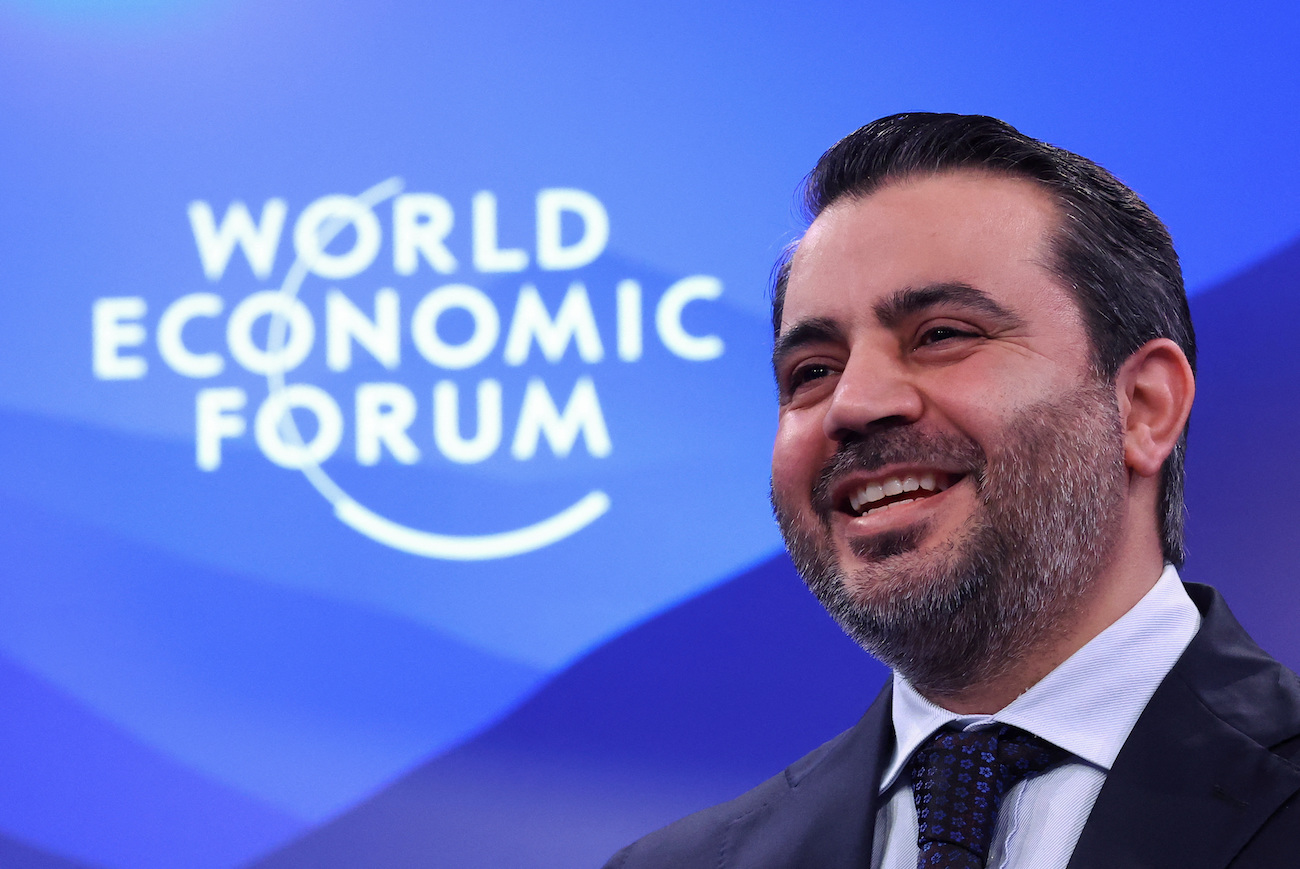
“The Syrian people shouldn’t be punished” now that the deposed ruler was no longer in power, said Al-Shaibaani. “We inherited a collapsed state from the Assad regime, there is no economic system,” he added, saying he hoped “the economy in the future will be open.”
Al-Shaibaani said a committee had been formed to study economic conditions and infrastructure in Syria and would focus on privatization efforts, including of oil, cotton, and factories, while exploring “public-private partnerships to encourage investment into airports, railways and roads.”
Al-Shaibaani also confirmed that the country will open its economy to foreign investments, adding that Damascus was working on partnerships with Gulf states in the energy sector.
The new Syrian government has been especially keen to reach out to the Gulf states to reestablish ties, which have long suffered as a result of the Assad regime’s support for the narcotics trade.
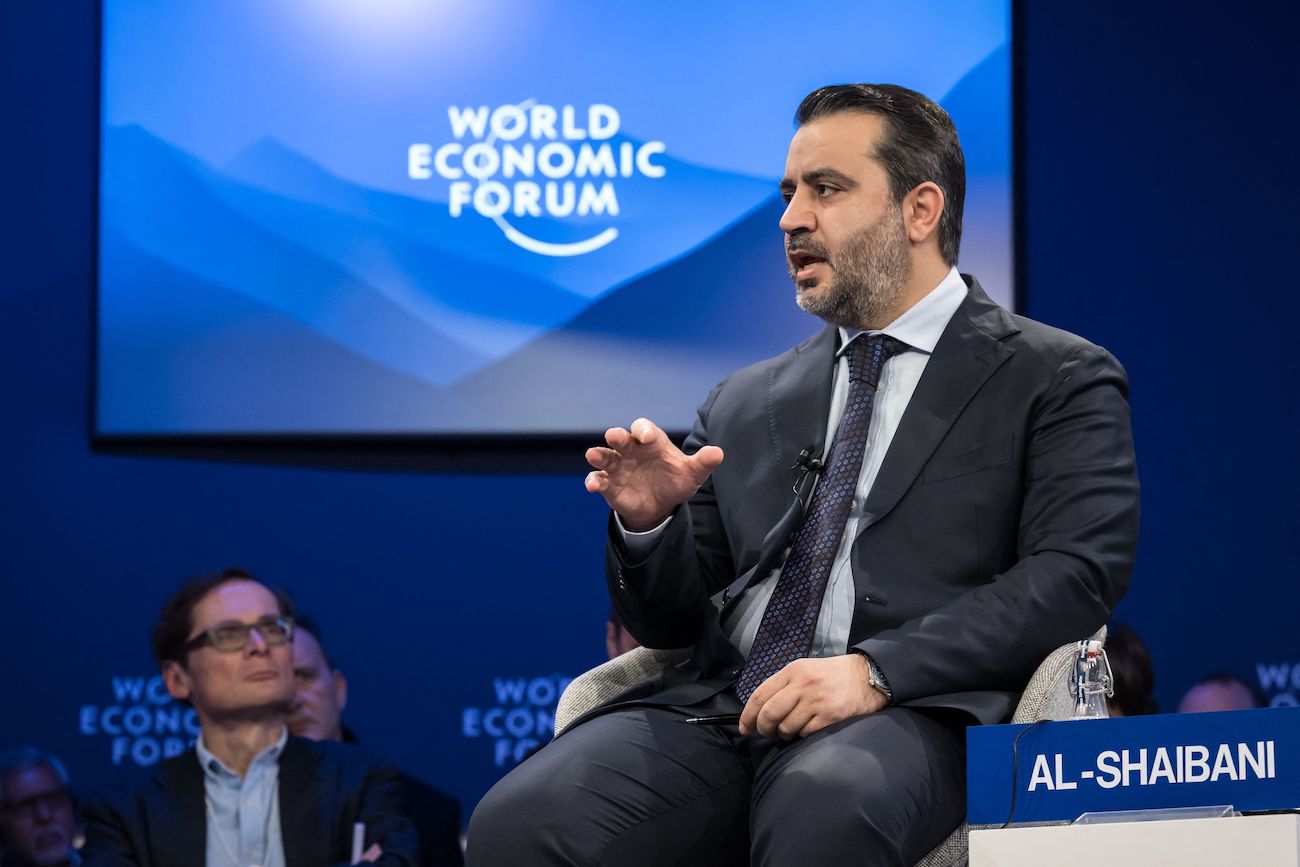
“We chose to visit the Gulf countries, because we wanted to fix the relations with these countries, where Assad had made a lot of problems for them,” Al-Shaibaani said.
“(The Assad regime) used harsh language against them, exported Captagon there, these are important countries to the region. But Syria should also take its role in the region, and they can help us with that.”
Al-Shaibaani was not the only Middle Eastern voice at Davos on Wednesday. Iran’s vice-president for strategic affairs, Javad Zarif, also shared his reflections on the regional situation in the wake of Israel’s ceasefires with Hamas and Hezbollah.
Speaking to CNN’s Fareed Zakaria, Zarif said: “The resistance will stay as long as the occupation stays, as long as repression stays. Resistance to Israel, to Israeli occupation, to apartheid, to genocide, existed before the Iranian revolution.”
Zarif said Hamas still exists in Gaza and that Israeli Prime Minister Benjamin Netanyahu did not achieve his goal of destroying the Palestinian militant group during the 15-month war in the enclave.
“Hamas is still there. Israel had to come to a temporary ceasefire. I hope it will be permanent, for the sake of 50,000 people who were massacred by Israel, so that there won’t be another 50,000, but resistance is not dead,” said Zarif.
“I can tell you that the wish for the resistance to go away has been based on a misrepresentation, a framing by Israel, that this is not an Israeli-Palestinian issue, but an Israeli-Iranian issue.”
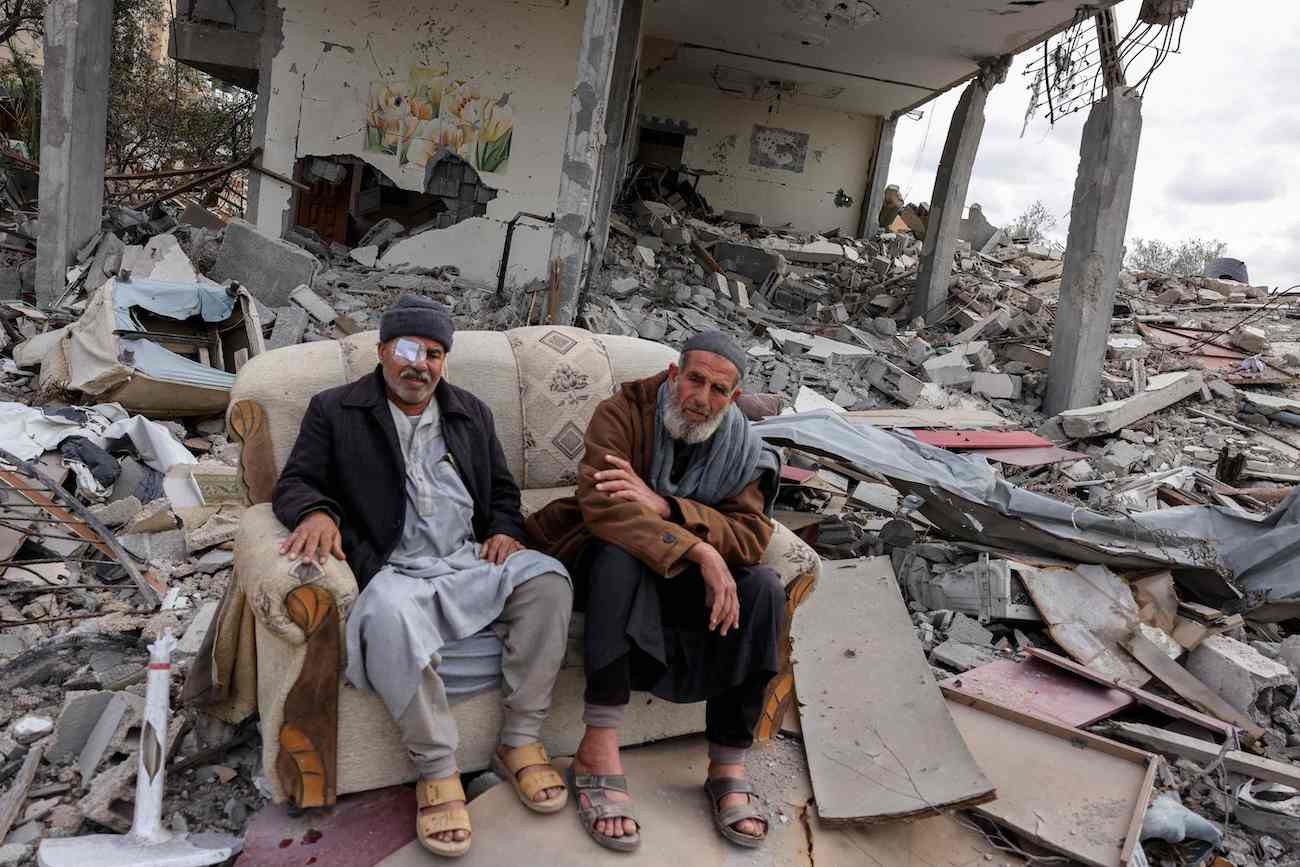
Zarif said the decades-old conflict can only be ended by resolving the Palestinian question.
“If you want to resolve the problem of Palestine, you should not look at Iran,” he said. “You should look at the Palestinian issue.
“As long as the Palestinian issue is there, the struggle will be there, the resistance will be there, and there will be support from the international community, including from Arab allies of the US.”
Speaking about US President Donald Trump, Zarif said he hoped “a ‘Trump 2’ will be more serious, more focused, more realistic” when dealing with Iran.
In 2018, during his first term, Trump withdrew from the 2015 nuclear deal negotiated by his predecessor Barack Obama, and re-imposed sanctions on Tehran as part of his “maximum pressure” policy against the regime.
Tehran responded by breaching the deal in several ways, including by accelerating its uranium enrichment program.
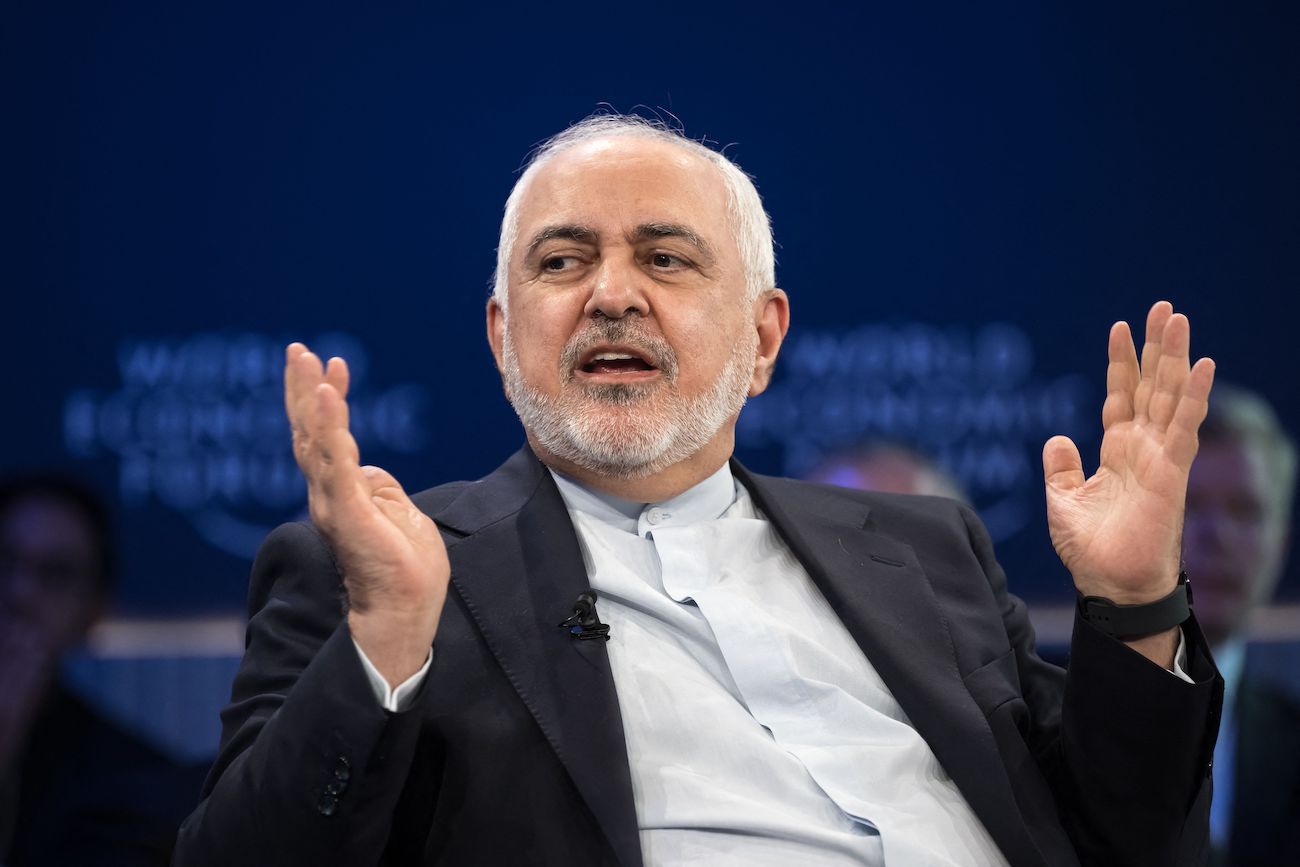
Trump has vowed to return to the policy he pursued in his previous term that sought to use economic pressure to force Iran to negotiate a deal on its nuclear program, ballistic missiles, and regional activities, including its support for proxy militias.
Zarif added that Iran has good relations with Saudi Arabia and the UAE and that he has proposed a new arrangement in the region that is based on amity.
“I have proposed in an article I recently wrote in The Economist, after my Foreign Affairs article, that we should have a new arrangement in this region,” he said.
“I call it MWADA: Muslim, West Asia Dialog Association. In Arabic, ‘mwada’ means ‘amity,’ and the title in The Economist was ‘Amity instead of enmity.’ Let’s do that.”
In his own address earlier in the day, UN Secretary-General Antonio Guterres lamented the recent rash of conflicts in the Middle East.
“We see a multiplication of conflicts, some of which are leading to a reshaping of different regions of the world — not least the Middle East,” he told the annual meeting.
He did, however, highlight recent progress, including the ceasefire deal between Israel and Hamas, which has already resulted in the exchange of several prisoners and hostages.
“There is, finally, a measure of hope when the ceasefire and hostage release deal in Gaza takes place — and we are working to surge up desperately needed humanitarian aid,” Guterres said.
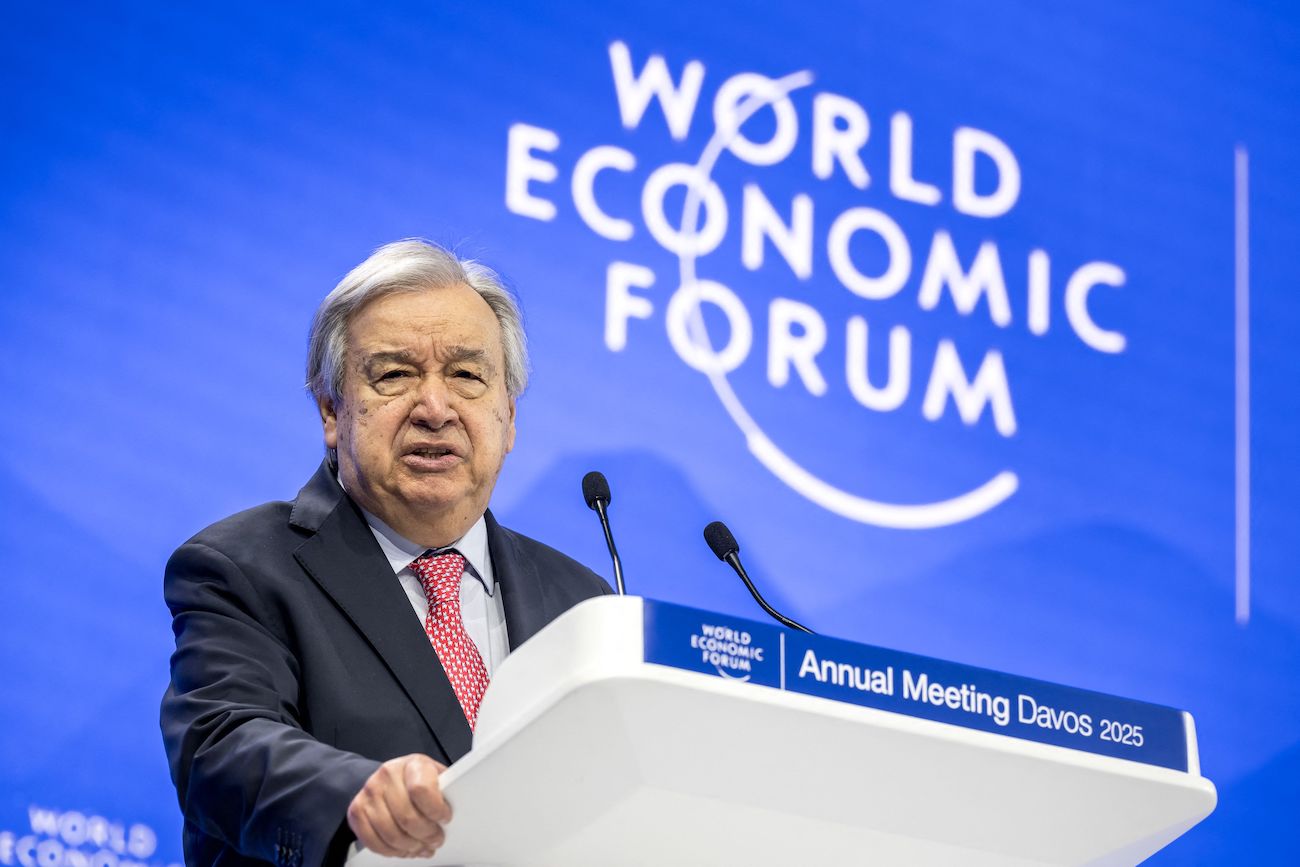
He also lauded the recent ceasefire between Israel and the Iran-backed Hezbollah militia in Lebanon and the election of a new Lebanese president and prime minister, potentially ending years of political deadlock.
“I was also just in Lebanon where a cessation of hostilities is holding, and a new government is taking shape after two years of stalemate,” he said.
In relation to Syria, Guterres said there was still a danger of further disorder unless the victorious HTS formed an inclusive administration that could work with the international community.
“We still have a strong risk of fragmentation and of extremism in at least parts of the Syrian territory,” he said.
“It is in the interest of us all to engage to make things move in the direction of an inclusive form of governance and I think some gesture must be made in relation to the sanctions.”
Yemeni migrant found dead on French channel beach: official

- “It is a young man aged around 20 of Yemeni nationality,” the regional prefecture told AFP.
- Bodies have been found washed up repeatedly on the beaches around Calais in recent months
SANGATTE, France: French officials said Wednesday the body of a young man from Yemen had been found on a beach in northern France from where many migrants seek to cross the channel in small boats to England.
The body was not far from the water on the sandy beach in Sangatte outside the northern port of Calais, surrounded by about 10 police officers, an AFP photographer saw.
“It is a young man aged around 20 of Yemeni nationality,” the regional prefecture told AFP.
Bodies have been found washed up repeatedly on the beaches around Calais in recent months. The small boats used by migrants to cross the Channel often capsize or suffer from chaotic embarkations during which some passengers are left in the water.
After a record year for deaths in the Channel, clandestine crossings have continued in the middle of winter, despite sometimes freezing temperatures.
Fifty-nine migrants aboard a boat in difficulty were rescued Tuesday at sea in French waters, local officials said.
At least 77 migrants died in 2024 while trying to reach England on board small boats, a record since the start of this type of crossing in 2018.
On January 11, a 19-year-old Syrian died during an attempted crossing, “probably crushed” by other migrants during departure, according to the authorities.
Both London and Paris have vowed to crack down on the people smugglers who are paid sometimes thousands of euros by migrants to organize the crossing to England.
But the issue has also repeatedly caused tensions between the French and British governments. Paris has claimed that London’s lax enforcement of employment rules attracts migrants.
There have been high-profile arrests of people smugglers, but activists say the traffickers are now trying to pack more people into the small boats, making the crossings even more dangerous.
Israeli army builds wall on Blue Line, reinstalls border cameras

- Israeli army is using the remaining time in the ceasefire deal with Hezbollah to establish control over the Lebanese border area
- European Council approves $62m aid package for Lebanese Army ‘to carry out its sensitive mission’
BEIRUT: An Israeli force on Wednesday advanced into the Lebanese town of Taybeh, conducted extensive searches in the area up to Adchit Al-Qusayr and set fire to several homes.
Separately, an Israeli drone struck an area between Wadi Khansa and Al-Majidiya in the Hasbaya district.
The Israeli army is using the remaining time in the ceasefire deal with Hezbollah to establish control over the Lebanese border area.
A security source reported that the Israeli army reinstalled surveillance cameras and listening devices along the border.
The official National News Agency reported that the Israeli army “completed the construction of the concrete separation wall along the Blue Line from Yarin to Dahira.”
As the Lebanese army continues to establish positions in areas vacated by the Israeli army and prepares to enter the town of Hanine in the Bint Jbeil district, a number of residents from the towns of Al-Bayyadah, Shamaa, Alma Al-Shaab and Naqoura in the western sector were permitted to visit their hometowns.
Activists on social media circulated statements urging local populations to “prepare for Sunday, the date by which, according to the ceasefire agreement, the Israeli withdrawal from the border area should have occurred, allowing people to return to their towns.”
However, the Israeli army has continued to prohibit locals from entering the towns, using gunfire as a warning.
A statement issued to residents of Khiam urged caution and advised against hasty returns, “pending an official announcement from the relevant authorities to assess the security situation, as well as from the Lebanese Army, which is expected to clarify the situation on Saturday evening and determine whether a safe return is feasible.”
The statement said: “We are dealing with a treacherous enemy. Do not grant them the opportunity for betrayal, aggression, murder, bombardment and destruction once again.”
In support of the Lebanese Army, the European Council approved on Wednesday a third aid measure under the European Peace Facility, amounting to €60 million ($62 million) for the army.
The measure, according to a statement, “contributes to enhancing the capabilities of the Lebanese army to enable it — in line with Resolution 1701 — to redeploy and secure and maintain stability in the South Litani sector.
“This contributes to protecting the civilian population in the area, and works to enhance the operational capabilities and effectiveness of the Lebanese army, to contribute to national and regional security, thus allowing displaced civilians on both sides to return to their homes.”
Kaja Kallas, EU high representative for foreign affairs and security policy, said: “This new assistance represents a significant increase in the EU’s support to the Lebanese Armed Forces within the framework of the European Peace Facility, at a crucial stage in the implementation of the ceasefire agreement between Lebanon and Israel.
“The Lebanese Armed Forces are essential for regional and local stability, and deserve our full support in carrying out their sensitive mission. The EU and its member states remain strongly committed to supporting Lebanese state institutions and renewing the EU-Lebanon partnership.”
The resolution affirmed “the EU’s commitment to supporting the Lebanese Armed Forces’ capacity to redeploy in the South Litani sector, particularly following the 60-day ceasefire agreement.
“The Lebanese Armed Forces’ plan to redeploy in the South Litani sector is essential to accompany international efforts to achieve a permanent ceasefire and implement resolution 1701,” it said.
“The Lebanese Armed Forces is the main guarantor, alongside UNIFIL, to create the necessary security conditions to restore stability and security for the population on both sides of the border.”
Meanwhile, Sheikh Mohammed Khalil Hamadeh, a Hezbollah official in Western Bekaa, was shot in front of his home by unknown assailants on Tuesday evening. He was hit by six bullets and died in hospital.
It was the first assassination in Lebanese territory since a ceasefire agreement between Hezbollah and Israel went into effect 57 days ago.
An investigation has been launched to identify the perpetrators and the motives of the assassination, especially as Sheikh Hamadeh was a well-known figure in the region.
In a statement, Hezbollah mourned Hamadeh, describing him as “a leader and a warrior, who was martyred.”
Security information said that the gunmen who assassinated him were “driving a civilian car with tinted windows.”
Bekaa MP Ghassan Skaf did not rule out the potential involvement of Israeli spy agency Mossad, “which operates without being bound by any truce.”
He said: “The last war proved that the number of agents inside Lebanon, especially within the supportive environment of Hezbollah, was greater than even the party itself expected. Therefore, even if Israel were to withdraw completely from Lebanon, it would not halt its policy of assassinations.”
In another development, Layal Alekhtiar, Al Arabiya channel’s anchor, landed in Beirut on Wednesday and was accompanied by security forces from the airport to the Justice Palace in Beirut.
A search and arrest warrant was issued against her in November 2023 by the Lebanese Military Public Prosecution.
The warrant followed an inquiry initiated at the behest of individuals close to Hezbollah, following Alekhtiar’s live interview with Israeli army spokesman Avichay Adraee on Al Arabiya.
Lebanese law forbids interactions with Israelis.
A Lebanese security source said: “Alekhtiar was immediately referred to the first investigative judge in Beirut Fadi Sawan at the Justice Palace. Following the interrogation, Alekhtiar was released on bail for 50 million Lebanese pounds ($558).”
Two months after Hezbollah opened a front to support Hamas, Alekhtiar sparked outrage among Hezbollah supporters when she interviewed Adraee on Al Arabiya and addressed him as “ustaz” (mister) and thanked him as “the Israeli army spokesman.”
Alekhtiar had described the complaint against her on social media as “a blatant political persecution in the form of judicial repression,” adding that “this has nothing to do with truth and justice.”
She addressed those who filed the complaint, saying: “They are the ones who plundered the state, bankrupted the people, and gave up the nation’s sovereignty and wealth. They are now covering up their crimes with fabrications to suppress freedoms.”
She added: “You will never affect my freedom, my dignity and my convictions no matter what you do.”



